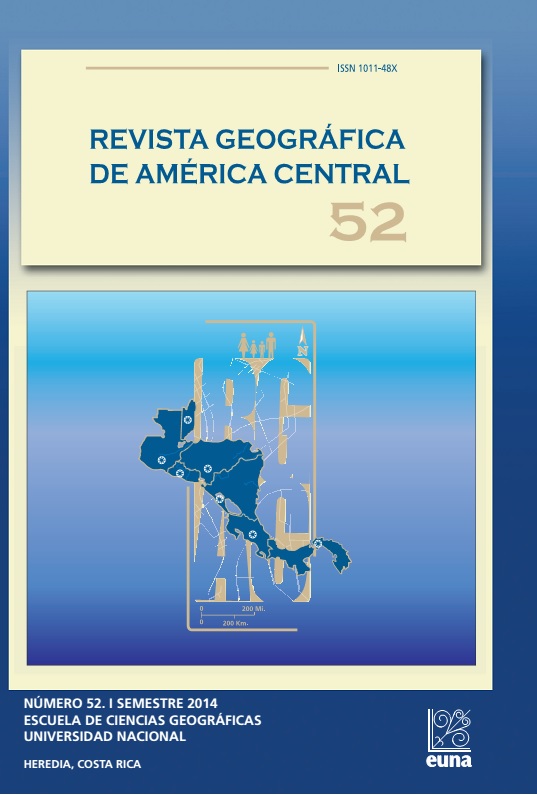HOW TO STUDY THE SOCIAL CITY? REFLECTIONS FROM THE CONTRIBUTIONS OF ALFRED SCHÜTZ
Keywords:
City, subjectivity, intersubjectivity, theory of actionAbstract
In urban geography, studies addressing the social dimension of the city from a materialistic and economic perspective abound. However, the topic is much less explored from a phenomenological perspective; that is, what exists in the consciousness of each subject, and to our knowledge, defines and redefines the city at all times. Therefore, it seems necessary to reflect on how each subject perceived and socially constructed their city from its subjectivity. To this end, this article focuses on the contributions made by Alfred Schütz for the study of urban space from a view that considers the social and intangible which are found in the conscience of every subject. First examined is the subjective and intersubjective nature of the city that is part of the “everyday life.” Then the “theory of action” as the basis for the constant reproduction of urban space is explored, and, finally, the reasons “for” and “because” as central to the urban researcher’s understanding and interpretation of the city from a social perspective.
References
Dukuen, J. (2010). Entre Bourdieu y Schutz: Encuentros y desencuentros en fenomenología social. Revista Latinoamericana de Estudios sobre Cuerpos, Emociones y Sociedad. 2(3), 39-50.
Gálvez, J. (2012). La ciudad: espacio de construcción de sujeto. Informes Psicológicos, 14(1), 61-69.
Leal, R. (2001). El problema de la intersubjetividad. Aproximaciones a la propuesta epistemológica de Alfred Schütz. Revista ALPHA, 17, 215-229.
Leal, R. (2011). La idea de “vivido- proyectado”: un criterio para interpretar las relaciones intersubjetivas en el campo de las ciencias sociales. Revista ALPHA, 33, 131-146. Ley, D. (1978). Social geography and social action. En Ley, D. y Samuels, M. (Eds.). Humanistic geography: prospects and problems. (pp.41- 57). London: Croom-Helm.
Lindón, A. (2007). Los imaginarios urbanos y el constructivismo geográfico: los hologramas espaciales. Revista Eure, 33(99), 31-46.
Lindón, A. (2009). Construcción socioespacial de la ciudad: el sujeto cuerpo y el sujeto sentimiento. Revista Cuerpos, emociones y sociedad, 1(1), 6-20.
Lindón, A. (2013). Revisitar la concepción de lo social para una geografía constructivista. En Zusman, P., Haesbaert, R., Castro, J. y Adamo, S. (Editores). Geografías culturales: Aproximaciones, intersecciones y desafíos. (pp. 177-212). Buenos Aires: Editorial de la facultad de filosofía y letras, Universidad de Buenos Aires.
Martín, M. (1993). La comunicación en la vida cotidiana, Fenomenología de Alfred Schütz. Navarra: Eunsa.
Mora, H. (2009). Mundo de la vida, comprensión y acción intersubjetiva en la sociología fenomenológica de Alfred Schütz. Revista CUHSO, 18, 5-68.
Downloads
How to Cite
Issue
Section
License
Proposed policy for journals offering Open Access
Authors publishing their works in the Journal acknowledge and agree to the following terms:
a) Authors retain the copyrights to their works and guarantee the Journal the right to be the first to publish their works, under the Creative Commons License Attribution-NonCommercial-ShareAlike 4.0 International, CC BY-NC-SA 4.0 International (https://creativecommons.org/licenses/by-nc-sa/4.0/deed.es), which allows others to share works upon complying with the acknowledgment of authorship and mention of the Journal as the original publisher of the work.
b) Authors are permitted to separately establish additional agreements for the non-exclusive distribution of the official edition of the work published in the Journal (for example, authors may desire to place the work in an institutional repository or incorporate it into a book that is to published elsewhere) so long they acknowledgment to recognize the Journal as the original publisher. The aforementioned additional agreements must respect the terms of the non-profit character and sharing philosophy of the original license (CC BY-NC-SA 4.0 International, https://creativecommons.org/licenses/by-nc-sa/4.0/deed.es).
c) Authors are encouraged to archive the post-print or editor/PDF version in Open Access repositories.






 REVGEO is licensed under https://creativecommons.org/licenses/by-nc-sa/4.0/deed.es
REVGEO is licensed under https://creativecommons.org/licenses/by-nc-sa/4.0/deed.es
.svg_4.png)

_(1).png)
_(1)_(1)_(1)_1.png)
(2)(1)(1)(1).png)
